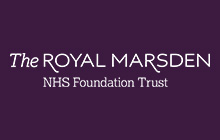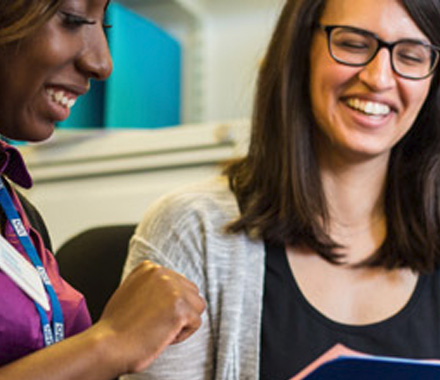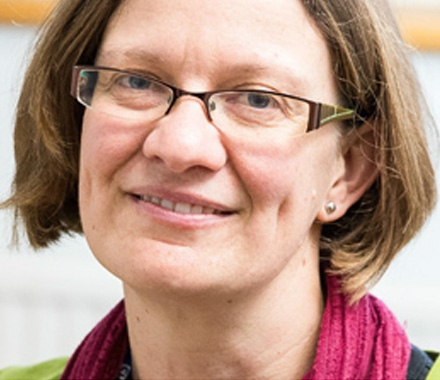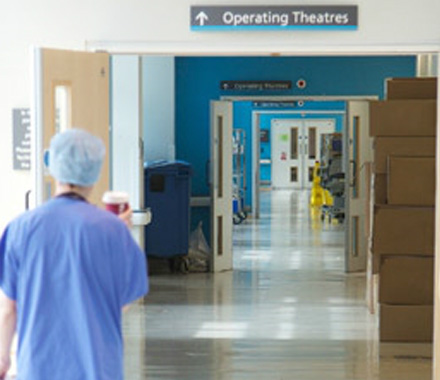
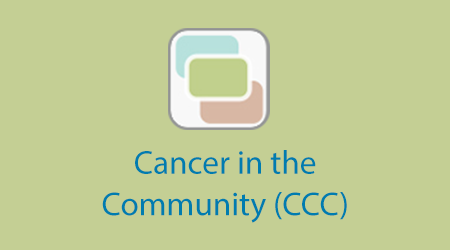
About the Cancer in the Community programme
The Royal Marsden School in collaboration with Health Education England South London has designed an elearning programme to provide an overview of the key issues in cancer care and to raise awareness of them. The programme aims to ensure knowledge for community-based workers related to the key aspects of cancer and its treatment becomes embedded into their daily activities, and aims to inspire them to support clients before, during and after cancer is diagnosed.
A number of national guidance and policy documents have highlighted a need to develop cancer services and education. Approximately 1.8 million people in England are currently living with a diagnosis of cancer; this number is increasing by over 3% each year and the total figure will rise to over 4 million by 2030. Evidence shows that many cancer survivors have unmet needs particularly at the end of treatment, whilst others are struggling with consequences that could be either avoided or managed. Some progress has been made in addressing these needs but more needs to be done. One recommendation from the All Party Parliamentary Group on Cancer (APPGC) is that GPs and community staff need more education and support to help them in identifying warning signs and symptoms of cancer, to facilitate earlier diagnosis; manage patients on treatment and be able to support patients living with or after treatment for cancer.
The four elearning sessions in this programme cover the following topics:
- Cancer Prevention and Screening
- Cancer Diagnosis and Staging
- Cancer Treatments
- Living With and Beyond Cancer
Open access sessions
Please note that if you access the content below, your progress and completion of sessions will not be recorded and you will not be able to generate a record of completion. If you require evidence of learning, please register and then log in to access this programme on the elfh Hub.
-
Cancer Prevention and Screening
This first session provides the background to what cancer is, its causes and how to reduce its risks, possible symptoms of cancer, what to do if you suspect a client has cancer, the importance of early detection and the national cancer screening programmes available.
-
Cancer Diagnosis and Staging
This second session explains how to understand diagnostic tests, the cancer staging and grading systems, the role of rapid diagnostic services, the acute signs and symptoms of a cancer-related emergency, and the role of the multidisciplinary team in cancer treatment decision-making.
-
Cancer Treatments
This third session provides an understanding of how cancer is treated, the side-effects of cancer and its treatments, the management of treatment toxicity and the symptoms associated with it, what to do in a cancer-related emergency and how to understand treatment responses.
-
Living With and Beyond Cancer
This fourth session explores the long-term consequences of cancer, the role of rehabilitation, the needs of clients returning to work and the importance of health promotion.
Meet the team

Hannah Drinkwater
Business Manager
Helen Foulser
Lecturer Practitioner
Katharine Malhotra
Lecturer Practitioner
Paul Mincher
Project Manager
Dr Rebecca Verity
Director of The Royal Marsden School
Prof. Theresa Wiseman
Strategic Lead for Health Service Research
Jo Walls
Community Advisor Consultant
How to access
In order to access the Cancer in the Community programme, you will need an elfh account. If you do not have one, then you can register by selecting the Register button below.
To view the Cancer in the Community programme, select the View button below. If you already have an account with elfh, you will also be able to login and enrol on the programme from the View button.
NHS healthcare staff in England
The Cancer in the Community programme is also available to NHS healthcare staff via the Electronic Staff Record (ESR). Accessing this elearning via ESR means that your completions will transfer with you throughout your NHS career.
Further details are available here.
Not an NHS organisation?
If you are not an NHS health or care organisation and therefore do not qualify for free access elfh Hub, you may be able to access the service by creating an OpenAthens account.
To check whether or not you qualify for free access via OpenAthens, you can view the eligibility criteria and register on the ‘OpenAthens’ portal.
Registering large numbers of users
If you are a HR, IT or Practice Manager and would like to register and enrol large numbers of staff within your organisation for access onto the Cancer in the Community programme, please contact elfh directly.
Organisations wishing to use their own LMS
For HR departments wanting to know more about gaining access to courses using an existing Learning Management System please contact elfh directly to express interest.
More information
Please select the following link for more information on how to use the elfh Hub.


